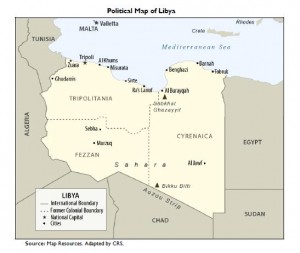Libyans Hopeful After Obama Speech
By Magharebia
By Essam Mohamed and Asmaa Elourfi
Libyans reacted positively to US President Barack Obama’s Thursday (May 19th) address on the recent changes sweeping the Middle East and North Africa.
“We have the chance to show that America values the dignity of the street vendor in Tunisia more than the raw power of the dictator. There must be no doubt that the United States of America welcomes change that advances self-determination and opportunity,” Obama said.
Specifically addressing the situation in Libya, Obama said: “Time is working against Kadhafi. He does not have control over his country. The opposition has organised a legitimate and credible interim council. And when Kadhafi inevitably leaves or is forced from power, decades of provocation will come to an end, and the transition to a democratic Libya can proceed.”
Obama’s remarks were warmly received in Benghazi, where National Transitional Council Chairman Mustafa Abdel Jalil said the speech “confirmed America’s position and its support of democracy. It’s a position that supports Arab peoples and their right to choose their own rulers. It also confirms the future of America which is tied to interests and Arab relations in the Middle East region.”
“He talked about the cries of freedom that must be respected in the Arab world; something that stresses America’s role in transferring the world from autocracy to democracy that aims to spread peace and security in the world,” Abdel Jalil added.
“As a Libyan people, we appreciate and value this support. We’re happy with the international attention that Libya is now attracting,” businessman Mohamed al-Fitouri told Magharebia.

In his turn, journalist Mohamed Fathi said, “I was delighted when I heard his words about how the cries of human dignity are now resonating in the region. I felt that he was hearing the call of revolutionaries. I was sure about that when he said that they were listening to the call of Libyans and that they would provide the necessary support for them. We want this suffering to bring us freedom, victory and enhancement of young people’s ambitions.”
“Obama has called for supporting half of the region’s population, i.e. women, so as to realise their potential. I hope that American women will support Libyan women,” Ms Nahla said.
Garyounis University teacher Manaji Ali said: “Obama clarified to us the position of the United States on the Islamic world, which is to provide humanitarian aid, rather than be a superior power. He told us that he was supporting freedoms and was defending the rights of civilians. The speech was like a token of friendship between America and Libya.”
Mabrouka al-Haoaz, a doctor in the Libyan city of al-Marj, said that he was happy with the “calls for peace” in the president’s address. “He talked about the Arab reality, and if he acted on what he said, peace would prevail,” al-Haoaz said.
“I’m very happy with Obama’s speech because he mentioned Benghazi more than once,” commented Ahmed Mohamed, an engineer from Ras Lanuf. “In addition, his words about Kadhafi were encouraging.”
Meanwhile in Tripoli, political analyst Mohamed Ramadan told Magharebia that he was “very happy with that speech which supports the revolutionaries”.
“Time is not in Kadhafi’s favour and he will eventually leave,” Ramadan said. “This comes from his words that the ‘winds of change are sweeping across the Arab region’, and that the United States needs innovative ways to deal with it. We hope that these new ways will be in the form of support given to revolutionaries and young people so as to make that change and democracy a reality.”
Obama concluded by quoting the US Declaration of Independence, adding that those words “tell us that repression will fail, and that tyrants will fall, and that every man and woman is endowed with certain inalienable rights”.
